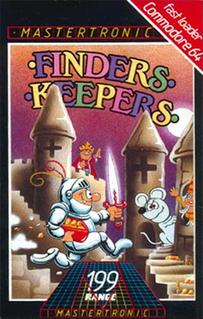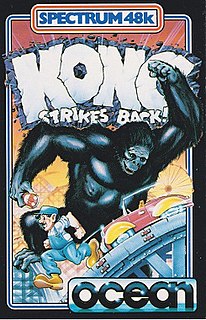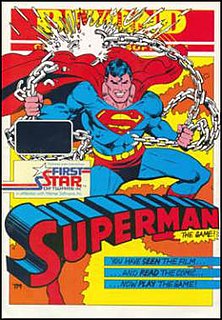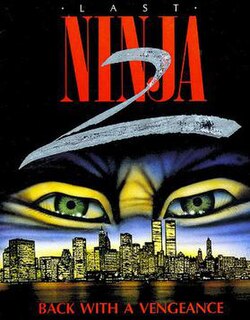Related Research Articles
Andrew Nicholas Oliver and Philip Edward Oliver, together known as the Oliver Twins, are British twin brothers and video game designers.

The Way of the Exploding Fist is a 1985 fighting game developed by Beam Software, by a team consisting of Gregg Barnett, Bruce Bayley, Neil Brennan and David Johnston. Originally developed on the Commodore 64 and published in June 1985 by Melbourne House, ports were made for Amstrad CPC, ZX Spectrum, BBC Micro, Acorn Electron and Commodore 16.

Game Over is an action video game developed by Dinamic Software and published by Imagine Software in 1987. It was released for the Amstrad CPC, Commodore 64, MSX, Thomson TO7, and ZX Spectrum. The game includes some adventure game elements. A sequel, Game Over II, was released in 1987.

One Man and His Droid is a game published by Mastertronic in 1985 for use on the Amstrad CPC, Atari 8-bit family, Commodore 16, Commodore 64, and ZX Spectrum home computer systems. The name of the game is a play on the title of the BBC television show One Man and His Dog. The object of the game is to use a doglike droid to collect Ramboids, the male form of alien sheep. The player must move these Ramboids into teleporters to win the game.

Artic Computing was a software development company based in Brandesburton, England from 1980 to 1986. The company's first games were for the Sinclair ZX81 home computer, but they expanded and were also responsible for various ZX Spectrum, Commodore 64, BBC Micro, Acorn Electron and Amstrad CPC computer games. The company was set up by Richard Turner and Chris Thornton. Charles Cecil, who later founded Revolution Software, joined the company shortly after it was founded, writing Adventures B through D. Developer Jon Ritman produced a number of ZX81 and Spectrum games for Artic before moving to Ocean Software.

Tornado Low Level is a multidirectional shooter developed by Costa Panayi and published in 1984 by the company he co-founded, Vortex Software. The game was released for the ZX Spectrum in 1984, with ports for the Amstrad CPC and Commodore 64 in 1985.

Finders Keepers is a video game written by David Jones and the first game in the Magic Knight series. It was published on the Mastertronic label for the ZX Spectrum, Amstrad CPC, MSX, Commodore 64, and Commodore 16 in 1985. Published in the United Kingdom at the budget price of £1.99. Finders Keepers is a platform game with some maze sections.
Crystal Computing, later renamed Design Design, was a British video game developer founded in 1982 by Chris Clarke and Ian Stamp while students at the University of Manchester. Graham Stafford, Neil Mottershead, Simon Brattel and Martin Horsley, joined the company as it expanded. The company's first software release was a compilation of games for the Sinclair ZX81, though it was with the ZX Spectrum that Crystal found its greatest success. A deal with the machine's manufacturer Sinclair to distribute Crystal's Zeus Assembler gave the company sufficient funds for a major marketing campaign for their next product, Halls of the Things, an arcade adventure game that became their most successful title.

Kong Strikes Back! is a 1984 platform video game published by Ocean Software in 1984 for the Amstrad CPC, Commodore 64 and ZX Spectrum. While its predecessor, Kong, is a Donkey Kong clone, Kong Strikes Back! is a clone of Mr. Do's Wild Ride with Donkey Kong-inspired graphics.
Hunchback is a video game developed by Century Electronics and published in arcades in 1983. The game is loosely based on the 1831 Victor Hugo novel The Hunchback of Notre Dame and the player controls Quasimodo. Set on top of a castle wall, the player must guide the Hunchback from left to right while avoiding obstacles on a series of non-scrolling screens. The goal of each screen is to ring the church bell at the far right.
Alligata Software Ltd. was a computer games developer and publisher based in Sheffield in the UK in the 1980s.

Splat! is a maze video game published for the ZX Spectrum in 1983 by Incentive Software of Reading, England. It was subsequently released for the Amstrad CPC, Commodore 64, and SAM Coupé.

Bruce Lee is a platform game written by Ron J. Fortier for the Atari 8-bit family and published in 1984 by Datasoft. The graphics are by Kelly Day and music by John A. Fitzpatrick. The player takes the role of Bruce Lee, while a second player controls either Yamo or alternates with player one for control of Bruce Lee.

Superman: The Game is a 1985 video game designed by Fernando Herrera and published in the U.S. by First Star Software for the Commodore 64. For European release, Superman was ported the Acorn Electron, Amstrad CPC, Atari 8-bit family, BBC Micro, and ZX Spectrum.
Addictive Games was a UK video game publisher in the 1980s and early 1990s. It is best known for the Football Manager series of games created by company founder Kevin Toms. The company was originally based in Milton Keynes, England and later relocated to Bournemouth, in southern England.

Last Ninja 2: Back with a Vengeance is an action-adventure video game developed and published by System 3 for the Commodore 64, ZX Spectrum and Amstrad CPC in 1988 as a sequel to the 1987 game The Last Ninja. The Acorn Electron, BBC Micro, 1990: Amiga, Atari ST, MS-DOS and NES ports followed in 1989. The NES version of the game was named simply The Last Ninja. In 1990, the Last Ninja Remix edition of the game was re-released for 8-bit systems.
Storm Warrior is a 1989 beat 'em up game developed and released by Elite Systems for the Amstrad CPC and Commodore 64 8-bit home computer systems. The game casts the player in the role of a prince on a quest to rid his kingdom of a witch's curse. It is unrelated to the 1984 game Storm Warrior.
The English Software Company, later shortened to English Software, was a Manchester, UK-based video game developer and publisher that operated from 1982 until 1987. Starting with its first release, the horizontally scrolling shooter Airstrike, English Software focused on the Atari 8-bit family of home computers, then later expanded onto other platforms. The company used the slogan "The power of excitement".

Jet-Boot Jack is a platform game written by Jon Williams for the Atari 8-bit family and published by English Software in 1983. It was ported to the Acorn Electron, Amstrad CPC, BBC Micro, and Commodore 64. A C64-only sequel, Legend of the Knucker-Hole, followed in 1984.
References
- 1 2 "Heroes of Karn cassette inlay".
- ↑ "Lemon64 - Heroes of Karn, the".
- ↑ "Personal Computer Games Commodore 64 Review", Personal Computer Games (4): 74–75, March 1984
- ↑ "Adventures in Colour", Personal Computer Games (7): 107, June 1984
- ↑ "My Ten All-time Favorites", Zzap!64 , Newsfield Publications Ltd (1): 67–68, June 1985